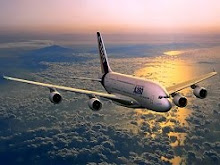Monday, November 29, 2010
Air Bus A-380
Airbus claims greater size equals greater environmental benefits. The new plane, the company boasts, will help ease the increasingly congested airspace. By transporting more people, the plane's fuel-burn per passenger will make it more environmentally friendly than most cars, Airbus says.
Many critics are not so sure.
They say Airbus officials may be stretching their math by calculating for more passengers than most A380 flights will actually carry. Furthermore, critics argue, the plane's technological improvements are simply what is to be expected in any new airplane.
"Megajets are not the way to greener, or cleaner, skies," said Alan Durning, executive director of Northwest Environment Watch in Seattle, Washington. "On almost no count is the A380 particularly green."
Fuzzy Numbers?
The Airbus 380, which makes its maiden voyage this spring before entering passenger service in 2006, is the world's first twin-deck, four-aisle airliner.
A wide staircase leads to the upper level, where first-class and business-class passengers will likely be seated. In an Airbus conception, each first-class seat folds open into a bed. On the main deck, the coach section will look similar to coach sections on airplanes today but with an extra inch (2.5 centimeters) of width in each seat.
In spite of its more powerful engines, the A380 will make less noise than its closest competitor, the Boeing 747. The noise dampening is thanks to new engine and wing technology, Airbus says. The company says the plane's fuel consumption will be 2.9 liters (0.76 gallon) per passenger per 100 kilometers (60 miles).
"The Airbus A380 will generate about half of the noise of a 747-400 [the biggest of the 747s], for example, and is also more fuel efficient than a small car," said David Velupillai, a spokesperson for Airbus in Toulouse. "It is able to do this through a host of new technology—newer, more efficient engines from either Rolls-Royce or Engine Alliance [a joint venture of General Electric and Pratt & Whitney], better aerodynamic design, and the use of newer and lighter materials."
But analysts have questioned the Airbus numbers. Boeing, not surprisingly, says the seat-mile cost differential between its 747 airliner and the A380 is very slim.
4 more Info plz visit : www.airbus.com/
Subscribe to:
Post Comments (Atom)



No comments:
Post a Comment